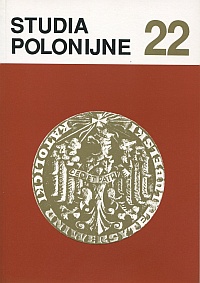Spanish Polonia Historical-Social Characterization
Main Article Content
Abstract
Starting from the twelfth century until the outbreak of World War Two there arrive in Spain mainly individual people, or small groups of Poles. Nevertheless, they played a significant role in many spheres. Due to the outbreak of World War Two a numerous group of Poles arrive din Spain. They were refugees from occupied Poland, France, and German camps. These people were well-educated patriots, and established the oldest polish group of emigration in Spain, characteristic of a high social status. The Poles who arrived in Spain in the 1970s and at the beginning of the 1980s had a similar position. After 1988 the most numerous group of Poles arrived in Spain. This recent emigration forms a separate group, consisted mainly of poorly-educated people, oriented basically at the material side of life.
The representative of the oldest and more recent emigration were active at the religious, socio-cultural, and scientific levels. Their life in Spain focused in the y ear 1956-1988 around the Rev. Marian Walorek and the Polish Catholic Mission which he conducted in Madrid. It was a great achievement of the PCK that they had organized in 1966 the celebration commemorating the Thousand Years of the Baptism of Poland in Spain. The Spanish nation joined the celebrations, paying homage to the Polish Church.
There were many Polish institutions which worked in Spain. The most important of them are as follows: the Polish section of the Radio Nacional de Espana , working in the years 1949- 1976, and the Madrid Legation of the Polish Government in exile. After World War Two Polish organizations of various profiles were established in Spain. We find there, among others, the Society of the Aid to Poles, the Association of Polish Academics in Spain, the Association of Polish Veterans, the Circle of the Eastern Territories of the Polish Republic, and the Association of Polish Technicians. Those organizations had one common goal, ie they sought to keep up the Polish spirit and mutual ties among Poles living in Spain. The representatives of the oldest and more recent emigration developed an editorial activity in Spain. After 1945 the following Polish papers appeared in Spain: ‘'Inter Nos” - a PCK bulletin in Madrid, “Przed Jutrem ” [Before Tomorrow] - a magazine of Polish students from Spain, ''Polonia ” - a Polish illustrated monthly in Spain, and also "Listy z Hiszpanii” [Letters from Spain], and a Polish informative bulletin '"El Correo de Varsovia ” .
In 1946 Polish students arrived in Spain, and they actively joined the life of Polish emigration. Over a dozen or so years they graduated from various faculties of Spanish universities, gaining prestigious jobs. The Poles living in Spain opened numerous centres there of a professional and cultural profile, among other things, a factory of mechanical vehicles, medical and paramedical centres, a Polish restaurant, a gallery, and a secondary school.
The versatile activity and perfect organization of the Polish community in Spain after 1945 aroused an intensive interest in the Polish spirit in this country. Among those who had largely contributed to the popularization of Polish culture, tradition, and language in Spain, one should mention Gabriela and Stanislaw Makowiecki, Rev. Marian Walorek, Prof. A. Derynga, Count Jozef Potocki, and Dr. Mirosław Sokołowski.
Despite the difficult contacts with the homeland, due to the political situation there, there was a continuous communication between the Poles from Spain and compatriots in Poland. This communication was important for both parties. At the time when the communist ideology prevailed spiritual support flowed from Spain, whereas the Polish community in Spain could preserve the most important Polish values.

